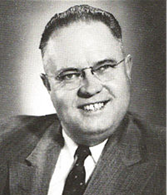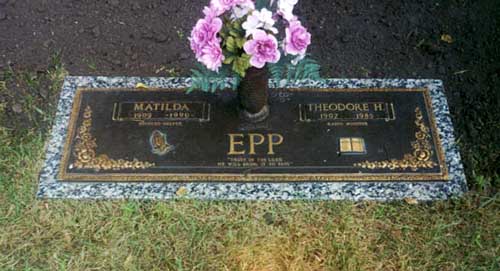Theodore Harold Epp
“We should never think that once we have given some money and time to the Lord that the rest is ours to do with as we please. All that we have belongs to God, so He should be taken into consideration in everything we do.”
(Theodore Harold Epp)
Early Life and Preparation
Theodore Harold Epp was born on January 27, 1907, in Oraibi, Arizona, into a missionary family of Russian Mennonite background. His parents served among the Hopi Indians in that region, and young Theodore grew up steeped in the faith and missionary heart of his family. He pursued his education at the Oklahoma Bible Academy and then at Hesston College in Kansas, before continuing his preparation at the Bible Institute of Los Angeles (now Biola University). In 1932 he earned his ThM from the Southwestern Baptist Theological Seminary in Fort Worth, Texas.
That academic foundation combined with his upbringing paved the way for a ministry that would blend solid scriptural teaching with missionary zeal.
The Start of His Ministry and Radio Calling
After seminary, Epp served pastorates, including one in Goltry, Oklahoma. It was during his time there that radio reached his ministry horizon. In November 1934 he was invited to preach on a local radio station—a moment that changed the course of his work. On May 1, 1939, Epp launched what became his hallmark ministry: the radio broadcast titled Back to the Bible. He began in Lincoln, Nebraska, with scant financial backing—reportedly only a few dozen dollars—yet with a firm conviction that God would provide.
From that modest beginning (a 15-minute daily slot on a small station), his vision expanded dramatically: by the time of his retirement his broadcasts were heard on hundreds of radio stations worldwide, in multiple languages. Epp’s core ministry strategy was simple yet profound: teach the Bible clearly, daily, and invite listeners to trust Christ, grow in faith, and view Scripture as life-changing. The program combined his Bible teaching with songs, a youth segment, and missionary appeal.
Growth and Institutional Development
Under Epp’s leadership the Back to the Bible ministry became far more than a radio show. It grew into a full-fledged international ministry—with programs in multiple languages, a publishing arm, youth programming, missionary support networks, and worldwide offices. Epp wrote nearly 70 books and numerous magazine articles, many of which took his radio messages deeper into print. Titles such as Why Do Christians Suffer? reflect his heart for helping believers navigate life’s trials through Scripture.
His approach was bold and pioneering: he believed radio could be used not merely for announcements or evangelistic appeals, but for deep, solid Bible teaching that would equip listeners long-term. In doing so, he advanced the idea that media and Scripture can serve disciple-making, not just outreach.
Character, Convictions and Ministry Ethos
Epp was marked by several enduring convictions: the authority of Scripture, the urgency of personal evangelism, and a global missionary vision. He often set aside one day each week on his broadcast to challenge listeners to think beyond their own borders and take the gospel to other nations.
He also demonstrated humility and persistence. His early financial resources were meagre, yet he forged ahead with trust in God. He emphasized consistency—daily broadcasts, persistent writing, and a steady ministry rhythm. Importantly, Epp’s ministry was not limited to adults. He regularly featured youth choirs, serialized drama segments aimed at younger listeners, and publications geared toward young believers. He recognized that ministry had to invest in the next generation. Through his work, Epp embodied the principle that ministry begins locally—pastoring, radio in a small station—but can expand globally when rooted in Scripture and faithfulness.
Legacy and Impact
Theodore H. Epp passed away on October 13, 1985, in Lincoln, Nebraska, and was buried in Lincoln Memorial Park.
His legacy lives on in several key ways:
- Back to the Bible: The ministry he founded continues, broadcasting in many languages, reaching millions globally. His vision for daily Bible teaching via radio has influenced countless Christian media ministries.
- Publishing: His books continue to be read, his teachings still accessible. His ability to transition radio messages into durable print resources provided a model for media-plus-ministry that others have followed.
- Global Mission Mindset: Epp’s commitment to world missions—not just sending but engaging media to reach the unreached—helped raise the awareness of radio as a frontier mission field.
- Media as Discipleship: He demonstrated that media ministry can go beyond evangelism into discipleship and theological teaching. The stability and depth of his program challenged a mindset of “quick spiritual fixes” and pointed to sustained growth and maturity.
- Model of Faithfulness: From his humble start (with $95 in his pocket to buy airtime) to his decades of daily teaching, Epp offers a model of perseverance and faithful ministry over time—even when early resources were limited.
Lessons for Today
From Theodore Epp’s life we can draw several practical lessons:
- Be faithful where you are: Epp began in a small station, without grand backing, yet trusted God with what he had.
- Let Scripture lead: His methodology prioritized the Bible itself as the foundation for teaching, not simply topical series or charismatic technique.
- Use media intentionally: He used radio, publishing, youth programming—not merely as add-ons, but as integrated ministries aimed at depth.
- Think globally: Even in humble settings, he held a vision for worldwide impact.
- Invest for the long haul: Ministry that lasts is sustained, consistent, steady—not just launched in a flash.
Conclusion
Theodore H. Epp stands as a significant figure in twentieth-century Christian broadcasting and ministry. His journey—from missionary-parent roots, seminary preparation, small-town radio beginnings, to international outreach—illustrates how faithful service and Scriptural commitment can multiply into global influence.
He reminds us that ministry is not built on resources alone, but on vision, obedience, and faith in God’s provision. And that even in changing media landscapes, the central call remains: teach God’s Word, reach the world, disciple the next generation—and trust God for each step. His life and legacy continue to inspire those who seek to leverage media, missions, and Scripture for Kingdom impact.
_____
Image Source/Credit (in order):
- Photos of Theodore H. Epp – Find a Grave Memorial. 27 Jan. 1907, www.findagrave.com/memorial/4572/theodore_h-epp/photo#view-photo=69628931.
- Photos of Theodore H. Epp – Find a Grave Memorial. 27 Jan. 1907, www.findagrave.com/memorial/4572/theodore_h-epp/photo#view-photo=95426.
Related
Sorry, no records were found. Please adjust your search criteria and try again.
Sorry, unable to load the Maps API.

